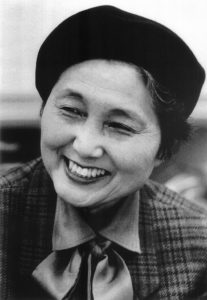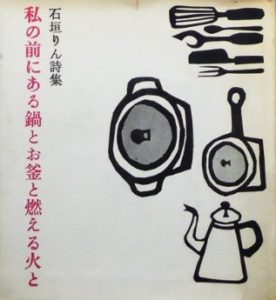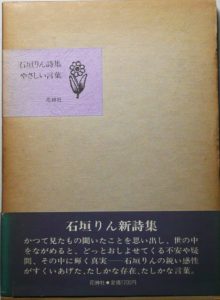 Rin Ishigaki (1920–2004), one of Japan’s leading modern poets, was born in Tokyo and lived there most of her life. A serious writer from her mid-teens, she went to work at a major bank at the age of 14 in order to finance her writing activities. After the destruction of her family home in one of the worst firebombings of Tokyo in 1945, she continued to work at the bank and became the sole support of her six-person family, while writing prolifically. Her sharpness of vision and down-to-earth understanding of everyday urban life, and of the politics of family and the workplace, helped to create her reputation as a writer of ‘life poetry’ and as a poet of resistance, but her works also display both humour and a moving lyricism. She published four volumes of poetry between 1959 and 1984, and her poems on war, work, women, and the quest for individual liberation made her nationally famous. She remains one of Japan’s most popular poets. Her four books of poetry are:
Rin Ishigaki (1920–2004), one of Japan’s leading modern poets, was born in Tokyo and lived there most of her life. A serious writer from her mid-teens, she went to work at a major bank at the age of 14 in order to finance her writing activities. After the destruction of her family home in one of the worst firebombings of Tokyo in 1945, she continued to work at the bank and became the sole support of her six-person family, while writing prolifically. Her sharpness of vision and down-to-earth understanding of everyday urban life, and of the politics of family and the workplace, helped to create her reputation as a writer of ‘life poetry’ and as a poet of resistance, but her works also display both humour and a moving lyricism. She published four volumes of poetry between 1959 and 1984, and her poems on war, work, women, and the quest for individual liberation made her nationally famous. She remains one of Japan’s most popular poets. Her four books of poetry are:
Watashi no mae ni aru nabe to okama to moeru hi to ( Before me the soup pot the rice pot and the bright burning flame), 1959.
Hyōsatsu nado ( Nameplates and more), 1968.
Ryakureki ( My life in brief), 1979.
Yasashii Kotoba (Tender words), 1984.
Translations by Janine Beichman of poems from all four books are included in This Overflowing Light: Selected Poems. (Ishigaki also published three collections of essays: Yūmoa no sakoku (Humor’s forbidden country), 1973; Honō ni te wo kazashite ( Warming my hands at the flame), 1980; Yoru no taiko ( Night drum), 1989.



